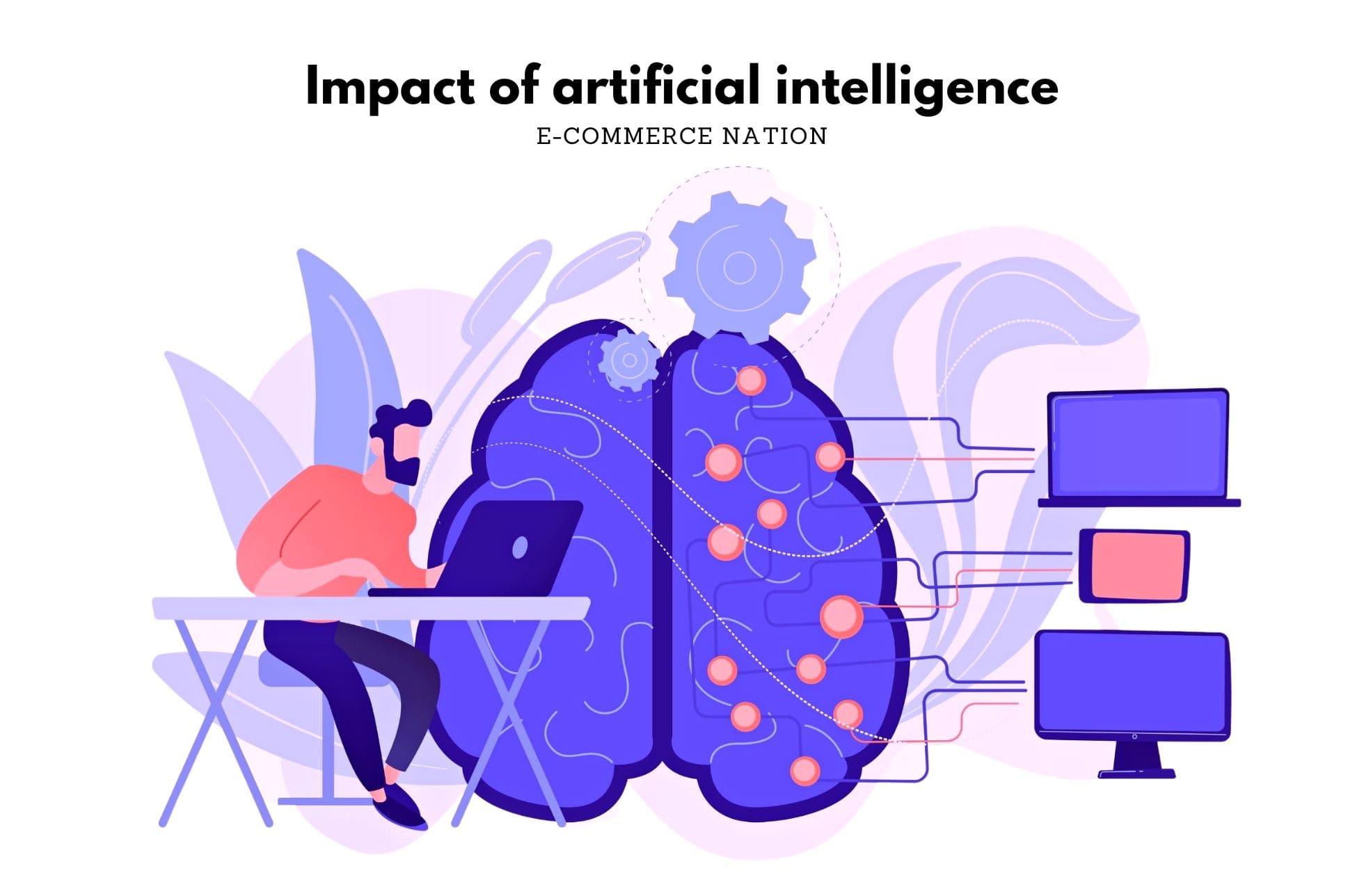Tasks that usually would take an hour; now can be done in 10 minutes using ChatGpt. Are you enjoying the advanced performance you’re getting? It is amazing, right? But what if in the future your whole business is replaced by an AI? What if the Terminator movie becomes a reality?
Get ready and brace yourself for the new era of AI.
The rapid advancements in artificial intelligence (AI) have revolutionized various industries, bringing both benefits and challenges to businesses worldwide. AI’s transformative power has reshaped operations, decision-making, and customer experiences.
However, its implementation also raises concerns about ethics, privacy, and transparency. In this article, we examine the impact of artificial intelligence and the benefits, and challenges of using AI in businesses today and in the future.
What is Artificial Intelligence?
Artificial Intelligence, or AI, refers to the simulation of human intelligence in machines to perform tasks that typically require human intelligence. AI encompasses various technologies, including machine learning, natural language processing, and deep learning.
These technologies enable machines to analyze data, learn patterns, make decisions, and perform tasks autonomously.
Positive Impact of Artificial Intelligence on Businesses
One side of this double-edged sword -AI- is that It has emerged as a game-changer for businesses, revolutionizing how they operate, make decisions, and interact with customers. This cutting-edge technology holds immense potential and has become a catalyst for transformation in various industries.
By harnessing AI’s power, businesses can unlock a multitude of benefits that significantly impact their efficiency, productivity, customer experiences, and bottom line. Here are some of the major positive impacts of artificial intelligence on businesses:
- Efficiency and Productivity
- Decision-making and Data-driven Insights
- Customer Experience and Personalization
- Cost Reduction

Efficiency and Productivity
One of the impact of artificial intelligence is that it can streamline processes and reduces manual labor and increases operational efficiency. Tasks such as data entry, inventory management, and customer support can be automated, saving time and resources.
Other aspects of business like technical programming and coding, content creation, and many other tasks can be done much faster than ever before.
Decision-making and Data-driven Insights
AI algorithms can analyze vast amounts of data quickly, extracting valuable insights to inform strategic decisions. Businesses can gain a competitive edge by leveraging AI’s ability to identify patterns, detect trends, and generate accurate forecasts.
Customer Experience and Personalization
AI-powered chatbots and virtual assistants provide personalized customer interactions, address queries, and offer recommendations. Through AI, businesses can deliver tailored experiences, enhancing customer satisfaction and loyalty.
Cost Reduction
By automating routine tasks and optimizing resource allocation, AI helps businesses reduce operational costs. Efficiency gains, improved inventory management, and predictive maintenance contribute to overall cost savings.
Besides mentioned benefits, AI can bring some disruptive innovations that no one can forecast until they happen. Revolutionizing the business model of modern businesses can be a possibility.
Danger of AI for Businesses
Now It is time to take a look at AI in the way James Cameron did in the “Terminator”.

While the integration of Artificial Intelligence (AI) has brought tremendous advancements and opportunities for businesses, it is not without its dangers. Despite its ability to reshape industries, this revolutionary technology results in new forms of danger for businesses.
From ethical considerations and privacy concerns to workforce implications and the need for transparency, these challenges require careful attention and strategic approaches to ensure responsible and successful AI implementation.
By directly confronting and tackling these challenges, businesses can unlock the complete potential of AI while effectively managing the accompanying risks.
- The Negative Impact of Artificial Intelligence on Employment
- Ethical Considerations and Potential Biases in AI Algorithms
- Data Privacy and Security Concerns
- Lack of Transparency and Explainability in AI Systems
- Misleading information hazard
The Negative Impact of Artificial Intelligence on Employment
AI’s automation capabilities may disrupt certain job roles, leading to concerns about job displacement and unemployment. However, the dynamic nature of AI also creates opportunities for upskilling and the emergence of new job roles.
We can name 2 major topics that rise concerns about the Negative impact of artificial intelligence on Employment:
1- Job Displacement and Automation:
One of the primary concerns surrounding AI is the potential displacement of human workers by automated systems. AI-powered machines and algorithms can perform repetitive and routine tasks with high precision and speed, leading to the replacement of human workers in certain roles.
Industries such as manufacturing, customer service, and transportation are particularly susceptible to this form of job displacement. As businesses embrace AI automation, it is essential to consider the potential impact of artificial intelligence on employees and explore strategies for managing workforce transitions.
2- Shift in Skill Requirements:
The integration of AI often leads to a shift in skill requirements within the workforce. While some job roles may be eliminated, new roles emerge that require expertise in managing and optimizing AI systems.
This shift highlights the need for upskilling and reskilling programs to help employees adapt to the changing job landscape. Businesses should invest in training initiatives to equip their workforce with the necessary skills to collaborate effectively with AI technologies and take on new roles that leverage human capabilities alongside AI.
Ethical Considerations and Potential Biases in AI Algorithms
AI systems rely on training data, which may carry inherent biases, leading to biased decision-making. Ensuring fairness, accountability, and transparency in AI algorithms is essential to mitigate potential ethical issues.
Data Privacy and Security Concerns

AI relies heavily on data, raising concerns about privacy and security. Safeguarding sensitive customer information and ensuring compliance with data protection regulations is crucial when implementing AI solutions.
Lack of Transparency and Explainability in AI Systems
AI algorithms can be complex, making it challenging to understand and explain their decision-making processes. Businesses must strive for transparency and interpretability to build trust in AI systems.
Misleading information hazard

Despite the remarkable capabilities of AI, it is not infallible. Businesses must remain cautious about overreliance on AI systems and carefully validate their outputs to avoid making critical decisions solely based on AI-generated insights.
When you look at the answers of ChatGpt, you will notice that it has a great ability to show results in an authentic and trustworthy way.
For example, if you ask for a solution for your business, it uses an appealing and professional tone of voice and almost flawless writing. If the answer itself is hidden in fancy and professional words, how can a normal person understand that it may include some misleading or completely wrong solutions?
Implications of AI on Daily Tasks of Businesses
Artificial Intelligence (AI) has the potential to revolutionize daily tasks and operations within businesses across various industries. By automating processes, augmenting human capabilities, and providing data-driven insights, AI brings transformative implications to several key areas of business functionality.
AI can provide significant assistance in four primary categories of activities:
- Content Marketing and Creation
- Gaining Knowledge About a Topic
- Assisting in Generating New Ideas
- Coding and Programming

Let’s explore what is the impact of artificial intelligence on daily tasks and operations in more detail:
Content Marketing and Creation
AI-powered tools have emerged as valuable assets in content marketing and creation. Natural Language Processing (NLP) algorithms can generate high-quality, engaging content, ranging from blog articles and social media posts to product descriptions.
AI can assist businesses in optimizing content for search engines, identifying relevant keywords, and even suggesting topic ideas based on market trends and customer preferences.
Interested in content marketing? Make sure to read the “Content Marketing Strategy Framework: Everything you should know” article.
Gaining Knowledge About a Topic
AI-driven research tools enable businesses to efficiently gather information, gain insights, and stay updated with the latest industry trends. Machine learning algorithms can analyze vast amounts of data from various sources, extracting relevant information and providing comprehensive reports.
This saves time and resources while empowering businesses to make informed decisions and stay competitive in rapidly evolving markets.
Interested in the newest trends in digital marketing? Read the “What are the biggest trends in digital marketing in 2023?” article.
Assisting in Generating New Ideas
AI algorithms have the ability to analyze extensive datasets, identify patterns, and generate new ideas or solutions. By leveraging machine learning models, businesses can explore uncharted territories, discover innovative approaches, and enhance their creativity.
AI can be employed in brainstorming sessions, ideation processes, and problem-solving exercises, serving as a valuable collaborator and catalyst for innovation.
Coding and Programming
AI technologies have made significant strides in automating coding and programming tasks. Automated code generation, assisted debugging, and intelligent code completion are examples of how AI simplifies and accelerates software development.
AI-powered systems can analyze code repositories, identify best practices, and assist developers in writing more efficient, secure, and error-free code.
Business Intelligence and Artificial Intelligence
AI plays a vital role in transforming business analysis and intelligence processes. With the ability to analyze vast datasets and identify complex patterns, AI-driven analytics tools enable businesses to derive actionable insights and make data-driven decisions.
AI algorithms can uncover correlations, predict market trends, detect anomalies, and provide valuable business intelligence that helps optimize operations, enhance customer experiences, and identify growth opportunities.
You can read more about business intelligence in the “Uncover the Business Intelligence Implementation” article.
As AI continues to evolve, businesses must adapt their processes and workflows to leverage their potential fully. While AI brings numerous benefits, it is essential to strike a balance between AI-driven automation and human expertise to achieve optimal results.
By embracing AI’s capabilities and integrating them seamlessly into daily tasks, businesses can unlock new opportunities, stay competitive, and drive sustainable growth in the digital age.
Strategies for Effective AI Integration in Business
Integrating Artificial Intelligence (AI) effectively into business operations requires careful planning, consideration of organizational needs, and the implementation of appropriate strategies. Here are key strategies to ensure successful AI integration within a business:

Selecting the Right AI Technologies
Identify the specific needs and goals of your business before selecting AI technologies and vendors. Conduct thorough research, evaluate different AI solutions, and consider factors such as scalability, compatibility with existing systems, data security, and vendor reputation.
Collaborate with stakeholders, including IT professionals and department heads, to ensure that the chosen AI technologies align with the business’s long-term vision and objectives.
Building AI Competency within the Organization
Developing AI competency within the organization is crucial for successful integration. This involves investing in training programs to upskill existing employees, hiring AI experts, and fostering a culture of continuous learning.
By providing employees with the necessary knowledge and skills to work with AI technologies, businesses can maximize the potential of AI and drive innovation across various departments.
Change Management
Like any other digital transformation, AI can disrupt many structures and procedures in the company. It may pose challenges related to infrastructure, data readiness, change management, and integration with existing systems.
It is essential to create a robust implementation plan that outlines clear goals, timelines, and responsibilities. Engage stakeholders at all levels and communicate the benefits and expectations of AI integration. Address concerns, provide the necessary support, and ensure a smooth transition by gradually introducing AI technologies and continuously monitoring their performance.
Regulatory and Policy Implications
The rapid advancement of Artificial Intelligence (AI) technologies has raised significant regulatory and policy considerations. As AI becomes more prevalent in business operations, governments and organizations must address the legal, ethical, and societal implications associated with its use. Here are key aspects to consider regarding the regulatory and policy implications of AI:

Current and Future Regulatory AI Frameworks
Governments worldwide are working to establish regulatory frameworks that govern the use of AI in business. These frameworks aim to strike a balance between promoting innovation and safeguarding public interests.
Key areas of focus include data protection, privacy, fairness, transparency, accountability, and liability. Governments collaborate with industry experts, policymakers, and legal professionals to develop guidelines and standards for AI deployment, ensuring its responsible and ethical use.
Balancing Innovation and Accountability in AI Deployment
Regulatory efforts must balance the promotion of AI innovation with ensuring accountability for its consequences. Businesses need clear guidelines on AI system transparency, explainability, and risk management.
Regulators play a critical role in monitoring AI systems to prevent misuse and protect consumers’ rights. Striking the right balance requires ongoing dialogue between policymakers, industry stakeholders, and experts to adapt regulations to the evolving capabilities and applications of AI.
International Perspectives and Global Cooperation in Governing AI
Given the global nature of AI, harmonizing regulatory approaches across countries is essential to avoid fragmented and conflicting regulations.
International collaborations and initiatives are emerging to facilitate cooperation and the exchange of best practices in governing AI. Organizations such as the United Nations, the European Union, and the OECD are actively engaged in discussions to develop international standards, guidelines, and ethical frameworks for AI deployment.
Ethical Considerations and Algorithmic Transparency
Ethical considerations are central to regulating AI. AI algorithms can amplify biases, infringe on privacy, or have discriminatory effects. Policies should promote fairness, non-discrimination, and accountability in AI systems.
Ensuring algorithmic transparency, where possible, allows stakeholders to understand how AI systems make decisions and take appropriate measures to rectify any biases or unfair outcomes. Encouraging the development of ethical guidelines and providing mechanisms for third-party audits can enhance public trust in AI technologies.
Impact of artificial intelligence on Workforce and Social Equity
Regulations must address the impact of artificial intelligence on the workforce and social equity. Policies should focus on promoting job transitions, reskilling initiatives, and the creation of new employment opportunities.
Safeguards should be in place to prevent discriminatory practices in AI-driven hiring or decision-making processes. Additionally, regulations can encourage inclusive AI research and development to ensure diverse perspectives and prevent AI technologies from perpetuating social biases or exacerbating existing inequalities.
Intellectual Property and Data Ownership
Regulatory frameworks should consider intellectual property rights and data ownership issues related to AI. Clarifying legal frameworks for ownership and protection of AI-generated intellectual property and establishing guidelines for data sharing and consent is crucial.
Balancing the protection of proprietary AI technologies with fostering innovation and access to data for the public good is a complex challenge that requires careful legal considerations.
By addressing these regulatory and policy implications, governments and organizations can shape AI’s responsible and ethical deployment in business. Collaboration between policymakers, industry leaders, and civil society is essential to strike a balance that fosters innovation, protects consumer rights, and ensures the long-term societal benefits of AI technologies.
A thoughtful and proactive regulatory approach will play a pivotal role in shaping the future of AI integration in business and society as a whole.
Besides AI impacts, there are other trends in terms of customer tastes. Read the “How the Future of Ecommerce is Evolving” article to learn more about other aspects of future trends of ecommerce.
Conclusion
The impact of artificial intelligence on businesses can be both positive and negative. Its transformative power can drive efficiency, decision-making, and customer experiences. However, businesses must navigate potential pitfalls such as ethical considerations, privacy concerns, and transparency issues. By adopting appropriate strategies, considering regulatory implications, and prioritizing responsible AI integration, businesses can harness AI’s potential and leverage it as a powerful tool for sustainable growth and innovation.
Key Insights
- Artificial intelligence offers significant benefits to businesses, including improved efficiency, data-driven decision-making, personalized customer experiences, and cost reduction.
- Challenges such as job displacement, ethical concerns, data privacy, transparency, and the risk of overreliance on AI require careful consideration and mitigation strategies.
- AI has a profound impact on various business tasks, including content creation, knowledge acquisition, idea generation, coding, and business analysis.
- Real-world examples illustrate the successful implementation of AI in businesses across different sectors, showcasing tangible outcomes and best practices.
- Strategies for effective AI integration involve selecting suitable technologies and vendors, building AI competency within the organization, and addressing implementation challenges and change management.
- Regulatory frameworks and policies should aim to balance innovation with accountability, and global cooperation is essential in governing AI responsibly.
Frequently Asked Questions about the Impact of Artificial Intelligence
Will Artificial Intelligence Replace Humans?
While artificial intelligence has indeed transformed various industries, its goal is not to replace humans, but rather to enhance human capabilities. AI excels at handling repetitive tasks, analyzing vast data sets, and performing complex calculations. However, it lacks the nuanced understanding, creativity, and empathy that humans bring to the table. Rather than replacing humans, AI is poised to work alongside us, augmenting our skills and contributing to more efficient and innovative business operations.
What is AI Negative Prompt?
An AI negative prompt is a phrase or question that is designed to provoke undesirable or biased responses from AI models. It is often used to highlight potential pitfalls or biases in AI algorithms. These prompts are used to test the ethical implications of AI and to uncover any hidden biases that might be present in the responses generated by AI models. They play a crucial role in ensuring that AI systems produce fair, unbiased, and ethical outcomes.
What Are the 4 Types of AI Intelligence?
1- Reactive Machines: These AI systems can make decisions based on predefined rules and patterns, but they lack the ability to learn from new data or adapt to changing situations.
2- Limited Memory: This type of AI can use historical data to make more informed decisions, often used in tasks like self-driving cars.
3- Theory of Mind: AI with theory of mind would understand human emotions, intentions, and beliefs, allowing for more advanced interaction and communication.
4- Self-aware AI: The most advanced yet theoretical type, self-aware AI would possess human-like consciousness, self-awareness, and an understanding of its own emotions.
How Is Artificial Intelligence Useful?
Artificial intelligence is incredibly useful in various ways across businesses. It can automate repetitive tasks, analyze massive datasets for valuable insights, provide personalized customer experiences, and even assist in decision-making processes. AI’s ability to recognize patterns, predict trends, and optimize processes contributes to increased efficiency and effectiveness. It is a powerful tool that empowers businesses to operate more intelligently, make informed decisions, and innovate in ways previously unimaginable.
What Are the Positive and Negative Effects of Artificial Intelligence?
The impact of artificial intelligence is a double-edged sword. On the positive side, AI enhances efficiency, improves decision-making, personalizes customer experiences, and reduces costs. It has revolutionized industries and opened new avenues for innovation.
However, AI also raises concerns about job displacement, biases in algorithms, privacy breaches, and the potential for misuse. Striking a balance between harnessing AI’s benefits and addressing its challenges is crucial for responsible and ethical integration.
Is Artificial Intelligence Good or Bad for the Economy?
The impact of artificial intelligence on the economy is nuanced. On one hand, AI can lead to increased productivity, innovation, and the creation of new job roles centered around AI technologies. It has the potential to drive economic growth and improve overall efficiency in industries. On the other hand, the displacement of certain job roles due to automation and concerns about privacy and ethical implications can create challenges. The net effect on the economy will depend on how effectively businesses, governments, and societies manage the transition to an AI-driven landscape.
Image credit: vectorjuice at Freepik




